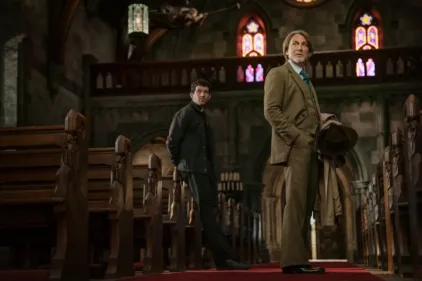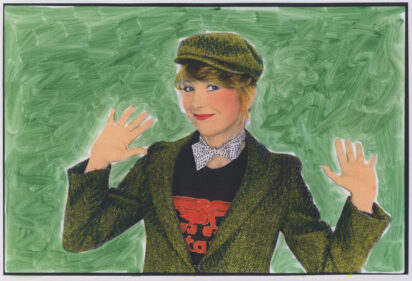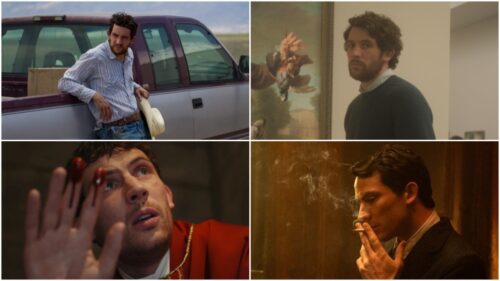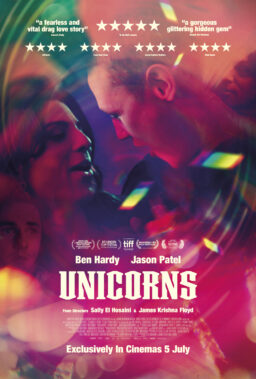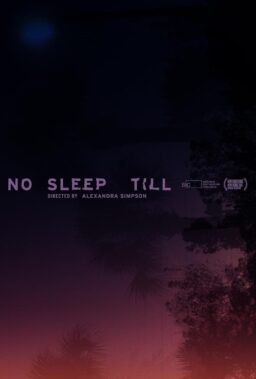CANNES, France Harmony Korine has seen the future of the cinema, and it is him. Nobody else is as young, as bright, as original, as inspired. Certainly not Quentin Tarantino, who is ancient at 35.
“I mean, he’s 15 years older than me. That’s a totally different generation. Someone wrote, ‘We don’t need another Boy Wonder at Cannes.’ And I was, like — well, I don’t think he’s a boy, and it’s like, he’s not MY generation. There’s no one making movies that’s my generation, you know; no one’s as young as me.”
Well, the Hughes Brothers.
“They’re older than me.”
They’re about 23.
“That’s still older than me. ‘Cause no one’s a teen- ager in art movies.”
That’s true. You’re not, either.
“But I was. I wrote my screenplay when I was 18 or 19. I was the youngest in history; I looked it up.”
Harmony Korine is the writer of “Kids,” which, in a year when Cannes drowsed and twitched in the midday sun, at least provided life and controversy. The movie, directed by Larry Clark, follows a group of Manhattan teen-agers through one long day of sex, booze, drugs, rock ‘n’ roll, skateboards, aimless violence and despair. Take your choice: It is either (1) a searing and accurate cry for help from a generation without hope, or (2) a cynical exploitation film that skirts the edges of kiddie porn. Both views had their defenders at Cannes; I tend toward the first choice.
The film has not yet been rated. It cost $70,000, and was bought for $3.5 million by Miramax after its sensational reception at the Sundance festival in January. If it gets an NC-17 rating, which is likely, Miramax will not be allowed to release it by its parent company, Disney. It may be sold to another distributor, or, one hears, Miramax partners Harvey and Bob Weinstein may form a separate company to release it.
The supporters of the film say it SHOULD be seen by those under 17, because it sounds an alarm about the dangers of promiscuous sex in the age of AIDS. The attackers quote Francois Truffaut, who said there is no such thing as an anti-war film because all movies make war look exciting. The film is so unrelenting in its dark, savage attitudes that even skilled apologists for sex and violence are struck dumb; for many of the movie critics at Cannes, “Kids” may at last have been the film that made them wonder if they were getting too old for their jobs.
What is certain is that no other film at Cannes this year had a defender quite like Harmony Korine. He is now, I think, 21 years old, although for Korine even that age seems so advanced that he is not quick to claim it.
Larry Clark, a celebrated photographer who wanted to direct a feature, found Korine in Washington Square Park, hanging out with a loosely knit crowd of skateboarders. He discovered that, at 16, Korine had talked himself into a job as a production assistant on Paul Schrader’s “Light Sleeper,” a Susan Sarandon film, and had written screenplays in high school — before dropping out of high school, as he has dropped out of every other institution that tries to define him, including his family and his own generation.
The day after “Kids” played at Cannes, we talked about it on the Miramax yacht, out in the harbor behind the Palais des Festival. Korine had his legs doubled under him and was kneeling on a couch, sipping ginger ale, talking fast, like one of those kids who wants to explain a Star Trek movie to you after you’ve seen it.
I wouldn’t ask this of somebody who had written a different kind of film, I said, but … what kind of a family background do you have?
“I have a pretty good family. But ever since I was little I just felt like I wanted to be on my own. It was the same thing about school. I was sitting in my classrooms, and I would feel the teachers were never telling me anything I didn’t know, or they were always trying to dictate to me how I should think, or …
“I mean, I love my parents, but it’s always been the same thing; it’s always been people telling me what to do and I JUST CAN’T STAND THAT. So I wanted to be on my own. I moved to my grandmother’s house and she was pretty much — she’s kinda — not senile, but she really can’t speak very well and she falls down sometimes and I could like, do whatever I wanted to, you know. I was out there and I was learning things on my own. I tried college and I hated that. I seem to quit everything I do. I just like finding things out on my own.”
Your parents. What do they do?
“They do different stuff. Now they live in Nashville, and they like, sell children’s clothing. But they do different things.”
Was Harmony the name you started out with?
“I was born Harmony and it was weird because when I was a little kid, I was picked on so much that when I was 13 I changed my name to Harmful. I thought it was a tougher name, so I had it legally changed. And then, I don’t know, it just didn’t seem to catch on, so … legally, my name is still Harmful, but I just said I’ll go back to Harmony. My parents were Marxists when I was little and then they became Trotskyites. I really haven’t kept in touch with them. I spoke to my mom before I came here; she like tried to give me a pep talk or something. Once I saw my dad on Canal Street; he was selling like turtles.”
He was selling turtles?
“Like sea turtles, those little turtles? It was pretty funny.”
And you, like, sort of lived the life that you portray in “Kids”?
“Yeah, I’ve pretty much been witness to most of the stuff. I mean, all the characters in the movie were based on kids I knew. I wrote it specifically for the people that are in the movie. I mean, it’s fictionalized obviously, I made it up, but it’s all based on stuff.”
It’s pretty frightening.
“I don’t think this is representative of like, all teen-agers. I just think like, this is a small segment. But at the same time it’s like I think this is taking place everywhere. I do think that kids are living like this wherever you go, even in rural areas across America, middle America, anywhere. Like even here in France, we invited some 15-year-old skateboard kids from the beach to see the movie, and afterwards they went, like, ‘Dis ees my favorite movie. Dis ees my life.'”
What Harmony was basically saying, I guess, was, don’t shoot the messenger. “Kids” is a docudrama about how real kids really live in a street society without rules or boundaries or parental presence. And Harmony has traveled among them and returned to write the story. His next screenplay, he said, is named “Ken Park,” will also be directed by Clark, and will take place inside the homes of the same kinds of characters who are in “Kids.”
But before that movie is made, he will direct his own first film, “Gummo.” It starts shooting this summer, maybe. The name comes from the fifth Marx brother, the one who wanted to sell women’s lingerie instead of being a comedian. But it’s not about the Marxes: “It’s about middle America. It’s about this small town where this tornado hit in Ohio and it’s not really one main character; it’s just totally random.”
Korine’s terror of being included in any group extends to his fellow filmmakers. He recoils at being compared with Tarantino, Roger Avary, Kevin Smith and other video brats who grew up in video stores and with camcorders in their hands.
“I’m not a video brat. I don’t derive all my inspiration through movies. I get it from a lot of other places too. Quentin Tarantino seems to be too concerned with other films. I mean, about appropriating other movies, like in a blender. I think it’s like really funny at the time I’m seeing it, but then, I don’t know, there’s a void there. Some of the references are flat; just pop culture.
“You can be inspired by other movies but not be derivative. I think that’s a problem with a lot of the video kids. I don’t even like video. I think you should see movies on the big screen. Because if you look at their movies, all these video brats, their movies to me look like … television, you know what I’m saying?”
“Kids,” it must be said, does not look like television. It plays and feels like a seamless window on life. After the screening, I talked with many sophisticated viewers who reacted personally to the irresponsible sex life of Tully, the central character. They “knew” he was an actor, in a scripted part, and yet they reacted to the film as if it was a documentary. This would have been high praise for the film, if it hadn’t made them so angry.
“I didn’t think about shocking people when I wrote it,” Korine said. “I didn’t even think about a message, you know. I wanted to make a movie and I wanted it to be like you’re just looking at a picture; like there’s no judgment. Because what I hate is all the crap that comes out of Hollywood right now. It’s belittling to the audience. They tell you exactly what to think. They pound you over the head with these messages and then there’s nothing left. There’s no margin of the undefined; it’s all there for you. In all my favorite films there’s always something missing. Something to make me curious. I wanted to do that with ‘Kids.’ I think one of the reasons why everyone’s so angry is because it doesn’t give you a definitive YES or NO — this is bad, this is good. If you have any kind of sense you’ll take away some kind of message, but if you can’t see past the shock, you’re not going to get anything.”
As Korine kept talking, I began to get the idea: Like another of the Marx Brothers, he did not want to belong to any club that would have him as a member.
“I just don’t want to be a part of any of those ‘generations,’ you know. What I’m gonna do is like stuff that people have never seen before.”
He includes the so-called Digerati, the computer generation: “I don’t know anything about that. That’s like Plato’s cave or something — the synthetic existence. I think that if I got into computers, I’d maybe get addicted or something. I have so much trouble with just like the real life, you know. Waking up, I feel so sad in the morning or something; I get so depressed just being alive sometimes. That’ll just give me a whole ‘nother world to get depressed about.”
Nor does he plan to get an agent: “I couldn’t stand it. I just feel like everyone tries to steal your soul, and corrupt you. I’d rather quit than be corrupted or anything. I’d just rather not do it, you know. I’d just rather sit in my room and sing or something.”


